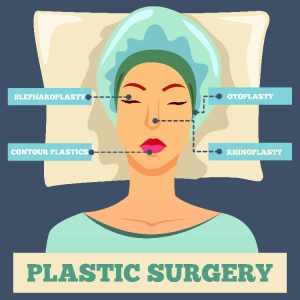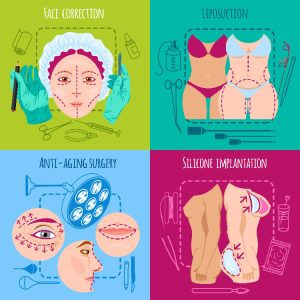What is cosmetic surgery?

Cosmetic surgery, also known as aesthetic surgery, is where a person chooses to have an operation or an invasive medical procedure to change their physical appearance for aesthetic reasons. This procedure can be beneficial for their psychological wellbeing and even provide health benefits.
Cosmetic surgery addiction, however, includes frequent visits to different surgeons; anxiety or depression when unable to undergo or wait for surgery; and a continuous desire for more surgery even trying to improve or better the results of the last procedure. This behaviour can be related to Body Dysmorphic Disorder which is a psychological disorder outlined by an obsession with continued perceived personal flaws or imperfections of the body, particularly when comparing areas of the body with pictures of others seen on social media or in TV reality shows.
Recent growth in aesthetics

According to published figures, in 2022 31,057 cosmetic procedures took place in the UK which was a staggering rise of 102% from just the previous year. These figures showed the greatest increase in cosmetic demand since auditing by the British Association of Aesthetic Surgeons was started in 2004.
Social media, in particular Instagram, is playing a huge role in providing information on plastic surgery which was previously provided only by word of mouth. Now people can see the published before and after results through real people sharing their life stories on the internet. Details of procedures, including where the surgery was carried out, are made available for anyone with an interest.
The top five cosmetic procedures for women in 2022 in the UK were
- Breast Augmentation 6,707 cases, up 67% from 2021
- Breast reduction 5,613 cases, up 122% from 2021
- Abdominoplasty 3,413 cases, up 129% from 2021
- Liposuction 3002 cases, up 135% from 2021
- Blepharoplasty ( eyelid surgery ) 2,778 cases, up 74 % from 2021
The top five cosmetic procedures for men in 2022 in the UK were
- Rhinoplasty 368 cases, up 45% from 2021
- Chest reduction 343 cases, up 158% from 2021
- Blepharoplasty ( eyelid surgery), 339 cases up 105% from 2021
- Liposuction 333 cases, up 150% on 2021
- Otoplasty (ear correction) 251 cases, up 72 % on 2021
These figures are likely to be the tip of the iceberg but the trend is clear. The audited UK figures indicate that the split between female and male procedures were female 93% of all cosmetic procedures to male 7% though both had a rise of over 100% .
These figures do not take into account the number of people who will be having more than one or multiple procedures during that 12 month period or the number of people who are have now started to go abroad, due to reduced costs for cosmetic surgeries, to a number of countries such as Turkey, Mexico, Thailand, Brazil, India, Czech Republic and now even South Korea.
Risks of having cosmetic surgery abroad
One of the main problems of accessibility to cheaper medical procedures abroad is the potential to be exposed to non-certified surgeons and medical facilities with lower standards. Secondly, air travel and major surgery increase the risk of a blood clot, which can be life threatening. In the UK there is normally a required procedure that there are several appointments with a surgeon and a cooling off period in case the individual changes their mind. Obviously these mental health and safety UK requirements are not applicable or being met overseas. For someone with a cosmetic surgery addiction, avoiding UK health regulations by travelling abroad can enable them to have multiple procedures without their unhealthy behaviour being questioned or challenged or even stopped by UK surgeons. Medical complications from overseas surgery can arise on returning home. Sometimes this can lead to the procedure not producing the new and improved “promised look”, possibly even making us feel worse about that particular aspect of our looks.
Having cosmetic surgery will not ‘fix’ how you feel about yourself inside
The major reason to undergo plastic surgery still remains a desire to improve body image. We want to improve the way we think about our body as we then feel that we will improve the way that we feel about ourselves. Research has shown that people who have low self esteem, or have been teased or bullied about their looks at a young age, are more likely to have more than one procedure. There is the expectation that the surgery will bring about a mental health improvement and that either people or the individual themselves will find that they become more attractive and their mood and feelings about themselves will dramatically change. For some people, they feel that undergoing some form of surgery will be the answer to all their mental health problems.
Aesthetics and mental health
Research has shown that there is a risk that, for some people, cosmetic surgery may worsen existing mental health problems. There is evidence that a significant number of people who have cosmetic surgery have experienced mental health problems whereas those having a general form of corrective surgery are less likely to do so. Research has also identified that people with body dysmorphic disorder do not obtain improvements to their psychological wellbeing after surgery. It is also the same for people with high levels of depression and anxiety – they tend not to experience any benefit from cosmetic surgery. This is in part due to two things: first they believe the surgery will be their “fix” for their mental health issues and second the result of the cosmetic surgery is not the image they had in mind.
People with body dysmorphic disorder have a preoccupation with perceived flaws in how they look or have a distorted body image. As a result, people may use cosmetic surgery to treat their dissatisfaction with their body rather than to treat the actual cause of their dissatisfaction which is the actual disorder and their lack of self worth. Surgery will not provide them with the mental satisfaction that they seek and can lead to multiple surgeries that can even lead to more severe mental health conditions due to deepening depression – they are never able to achieve an image that they are happy with when looking into a mirror.
Risk of addiction to pain medication
Another problem that multiple surgeries can create is an addiction to pain medication. People require pain medication following invasive surgery to manage the post operative pain. These medications may include prescription opioids which have the potential to lead to an opiate addiction if taken for an extended period after a surgical procedure. Some people feel that these opioids initially help with easing mental issues – and so the path to addiction can begin.
